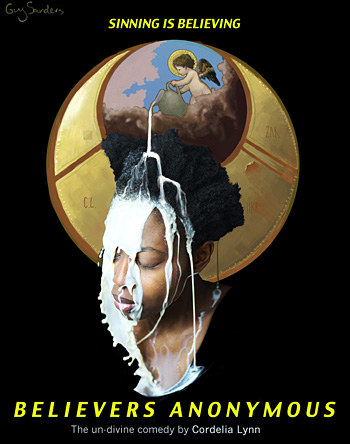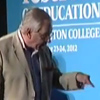 How did you give up your belief in God? Sheer will and determination? A GP-prescribed course of transdermal faith patches designed to reduce holy cravings? Or perhaps you inherited a secular teetotalism and never got tempted by a sip of the sacred?
How did you give up your belief in God? Sheer will and determination? A GP-prescribed course of transdermal faith patches designed to reduce holy cravings? Or perhaps you inherited a secular teetotalism and never got tempted by a sip of the sacred?
In a new play, Believers Anonymous, showing at the Rosemary Branch Theatre in Islington, “The Believers Anonymous 12 Step Programme” is a state-sanctioned course of rehabilitation designed to help people overcome their dependence on faith. Attendance of meetings is compulsory for anyone who still believes in God and the audience watches six characters obey this rule with varying levels of reluctance. The sessions are a peek into a dystopian future created by playwright Cordelia Lynn in which practising any religion is against the law.
The believers – a Jew, a Muslim, a Greek Pagan, an agnostic, and a “religiously promiscuous” Muslim/Hasidic Jew/Buddhist who doesn’t talk much but makes up for it with costumes – are reluctant to be “cured”. They are led by Joanne (Keisha Amponsa Banson), an ex-Christian with a relentless mission to keep tea and confession flowing. Most of her questions centre on the 12 Steps. The real-life 12 Step Programme, created by Alcoholics Anonymous to help addicts give up drugs and alcohol, has been criticised by those trying to find a path away from addiction that doesn’t lead to religion. Steps 3, 5, 6 and 11 all mention God and even with the added inclusive qualifier (“as we understand Him”) it is easy to see why it takes extra hard work and creativity to become an AA success story as an atheist.
The 12 Steps of Believers Anonymous are listed on the back page of the play's programme. Step 2 reads: “Came to believe that a Power greater than ourselves could restore us to sanity.” This Power is the Great Global Society, the political driving force behind the “Global law” that made religion illegal and is the bankroller of custard creams at the 12 Step meetings. Presumably the Global Committee runs a totalitarian police state, although this is never fully explained beyond the description of arrests and stints in prison, which happen to the characters off-stage. Instead the audience must rely on their understanding of dystopian fiction conventions to fill in the gaps. Unfortunately, this means that much of the joy of speculative fiction – surprising details about everyday life, which add up to a picture of a strange world that in turn illuminates our own strangeness – is lost because we’ve seen versions of the Great Global Society before. We don’t find out how total the policing is, what the socio-political situation is beyond the banning of religion, or even how long this has all been going on. The shock needed to make a dystopian drama really hit home is compromised by this lack of specificity and so is the impact.
Joanne’s single-mindedness leaves little space for uncertainty. She fully accepts the Global Society’s line, and though her criticisms of religious dogma are sometimes sharp, she falters when asked to explain why it must be banned. In Scene 2, she directs the group to discuss Step 1: “We admitted we were powerless in the face of our Belief – that our lives had become unmanageable.” Terry (Nick Finegan), the agnostic who, despite having an unidentified mental illness voices the most pertinent questions throughout the play, asks, “Why does it make your life unmanageable?” Joanne celebrates his input: “An excellent question! A thoroughly reasonable question. Well done Terry.” But once the others get involved, speculating that their lives are unmanageable because belief is illegal rather than because of the belief itself, she snaps. Believing in God is a mental illness, a danger to others and must be cured. “It doesn’t have to be dangerous,” counters the mousey Catholic, Mary (Tamsin Topolski). “Excuse me,” asserts Joanne, “but the only person here with four counts of aggravated assault is a Believer.” The statistical likeliness of this fact in a room where Believer to non-Believer ratio is 6 to 1 is not mentioned and the debate descends into interfaith bickering.
Joanne treats the adults like children who must be weaned off thumb sucking and they act accordingly with petulant insult slinging. The first time this happens we consider atheist condescension towards spirituality. Joanne’s obsession with defining faith as belief in God or not is a warning against the vision-blurring effects of literalness. The second and third time, we roll our eyes.
The recurring infighting restricts the development of individual characters and there is little opportunity for them to advance beyond simplistic defensive identities. Some space is given to the actors in monologues and their ruminations on the past glimmer with teasing potential. In an unusually affecting moment, Amatullah (Seda Yildiz), the feisty uncooperative Muslim character, remembers an incident in her school playground when her veil was ripped off and burnt by the other children. Catholic Mary’s reflections on the murder of her family in the Vatican Massacre suffer from lack of context.
Despite the weak regard given to character development and dramatic tension, Believers Anonymous isn’t boring. Lynn crams in so many ideas and though this harms the narrative, the playwright’s vibrant enthusiasm for taking on the big ones makes up for some of the clunkiness. Audience members are encouraged to muse along with the playwright: what is religion for? What should or could be the relationship between religion and the state? Isn’t religious thought a waste of energy? Isn’t everything a waste of energy? Will religious faith ever be replaced? What with? Where were the secular humanist critiques of the Vatican Massacre? Was tolerance killed with the religious? What prompts rebellion in a seemingly hopeless situation?
Somehow it’s possible to get something from this play without getting lost in the story, without shedding tears over the characters and without, well, believing in it. For story lovers, it’s a confusing miracle.
Believers Anonymous is at the Rosemary Branch Theatre, Islington, London from 6th – 23rd June 2012

